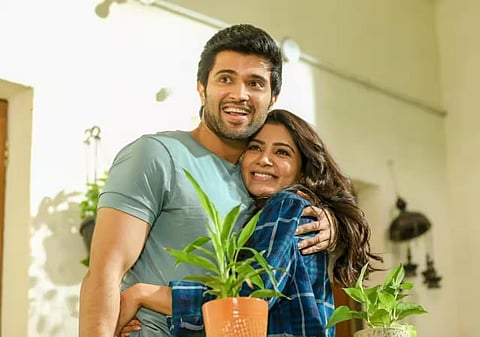

Writer-director Shiva Nirvana likes his Mani Ratnam films, it seems. Vijay Deverakonda, playing Viplav, talks more than once about Roja while seeking a job transfer to Kashmir.
As soon as he lands there, he says he has everything except Madhubala. You know in your bones that his quest shall be to fill up this romantic vacancy in his life—and as you can imagine, it doesn’t take him too long. While the film, in these portions, shows us terrorists and bomb blasts and gunfire, and there’s something about the India-Pakistan divide as well, Kushi is less about Roja than it is about another Mani Ratnam film, Sakhi. You see this in Viplav and Aradhya (Samantha) deciding to get married without the support of their families—particularly that scene of Viplav picking Aradhya up after she’s thrown out of her home, when she says—a la Shakti—that they will prove everyone wrong by living a happy life. You see Sakhi (or is it OK Bangaram?) in the elderly ‘model couple’ they interact with and learn from. You see it in the small arguments, once the Kailove Chedugudu phase ends. But the big difference is that while Sakhi ensures that we invest early in the romance and care about the couple, this never quite seems to happen in this film.
And that’s because the whole Kashmir episode—that shows Viplav and Aradhya falling in love—comes through only as a strange tourism advertisement. The scenic rivers, the picturesque snow-laden mountains, the local life and all of those blasted apples… The film hopes that on some level, like Viplav, we will also be singing, Paruvam vaanala… But places don’t make films; people do. And Viplav and Aradhya are not easy to feel for. Viplav decides, on first sight, that Aradhya is the one for him. This is, of course, a cue for a song, with strands of… Mangalyam Thanthunanena. By this time, the girl is hardly interested.
There’s something about an innocent lie gone wrong—which bizarrely results in Viplav abducting Kashmir children named Feroz. Meanwhile, the chase isn’t just restricted to Aradhya; there are actual bike chases as well. And while Viplav has taken time off his government job to pursue such bizarre missions, Aradhya (Samantha, restricted to wide-eyed, innocent looks) won’t talk about her deception. In fact, she is largely restricted to being a mute spectator as her friend and Viplav take turns deciding outcomes for her. Just as I’d almost given up on this superficial romance between a desperate man and a deceiving girl, the film brought something interesting to the table: An ideological struggle between militant atheism and extreme theism.
Alas, what we end up getting though is more unlikeable people into this world. Viplav’s mother insults her foreign daughter-in-law for being unable to call her name right; Viplav’s father can’t care for too much beyond ideological wins; Aradhya’s father (Murali Sharma, who’s great as always) can’t care beyond the significance of rituals, not even when his daughter is in profound distress… I could go on and on. When a film takes on such a debate (theism vs atheism, science vs religion…), you know it usually settles for a gentle, middle ground—and that’s fine, but here, it does feel like the film is kinder towards the theists. Viplav’s mother (Saranya) is a shackled woman in a home full of anti-faith posters. Viplav’s wife, Aradhya, has made the sacrifice of abandoning her ritualistic ways but points this out every chance she gets and keeps insisting that a ritual be performed to remedy the ills befalling them. Poor Viplav meanwhile gets mocked for being unable to tie his dhoti right. Viplav’s dad gets a transformative moment, but it’s quite easily eclipsed by Aradhya’s dad, a theist. It seems that as a society, we are still rather frightened of any potential critique of religion. That’s perhaps why Aradhya’s dad never once gets questioned. For all the film’s posturing that rituals don’t really matter, it still feels like a misfortune in Aradhya’s life had something to do with jathakam. It still feels like something about everyone’s acceptance of a ritual, something about a union in a temple, resulted in a positive outcome for everyone.
Ideological issues aside, the film does get better as it goes, but that’s not to say it improves enough. The ‘fights’ between Aradhya and Viplav barely register. The escalation of their conflict feels forced. In between, you keep getting intrusive distractions—like a train fight with young cricketers who misbehave only so Vijay Deverakonda can protect his pilla. An Arjun Reddy reference makes for a good joke, and Vijay comments that “the market has branded him wrong” and that he is actually a sthreepakshawadi. And yet, Viplav talks about putting women in their place. Does he ever truly transform? Why does he go on to compare a wife with dheyyam? Why does the film make a joke out of a man undergoing a fertility test? If his proclamation of his identity at the end of the scene is progress, why then does he go on to declare his test results on stage as an affirmation of his masculinity?
It helps the film’s second half that Rohini and Jayaram show why they are such great actors by making the most of an underwritten angle. But largely, this film about an ideological clash offers little to reflect on—and this story about dreamy-love-leading-to-marital-distress creates little emotional resonance. The strongest I felt was deep anguish… when quality non-vegetarian food—beef biryani, cheppala pulusu—kept getting discarded at different points in the film.
Director: Shiva Nirvana
Cast: Vijay Deverakonda, Samantha, Murali Sharma, Sachin Khedekar, Saranya, Lakshmi
Rating: 2/5 stars